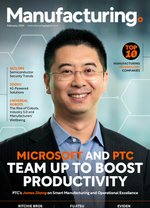Transforming Business Performance With Smart Manufacturing
In the area of smart manufacturing, companies need to enhance how they develop new products, orchestrate their supply chains, run their factories and serve their customers. This is where Eviden steps in, acting as a trusted advisor and providing support through the full lifecycle from consulting assessments to develop the strategy, roadmap and business case, through technology design and delivery, as well as on-going support and expert advisory.
Based in Bezons, France, Eviden is a global leader in data-driven, secure and sustainable digital transformation with a strong and growing portfolio and comprehensive partner ecosystem. The company formed as a carve out from Atos in 2023 and is set to become a fully independent company in 2024. It brings together the consulting, digital, big data, advanced computing and AI and security divisions of Atos. The company helps clients across both private and public sectors worldwide develop new capabilities to achieve and sustain better performance. Eviden currently operates in 47 countries, with over 57,000 people and has an annual revenue of c.€5bn.
Lee Fosbrook is a Partner at Eviden, in the Industry360 consulting and advisory practice, where he brings over 30 years’ experience in business performance improvement and digital transformation on an international scale.
“My role involves collaborating with our clients to help them achieve and sustain better performance and leverage the possibilities of digital transformation in their manufacturing operations and extended value chains,” he said. “In our Industry360 team we specifically work with companies who design, manufacture, assemble and maintain products and assets and operate the supporting supply chains. My team collaborates with clients across a broad set of industries including aerospace and defence, consumer products, automotive, pharmaceuticals, engineering and chemicals.”
Eviden helps its clients identify how they can tackle their key business and operational challenges. This often starts with a consulting assessment to develop a strategy and transformation roadmap, progresses into support to implement pilot projects and then rapidly scaling these across their operations network to maximise the performance impact and return on investment.
The challenges of manufacturing
Manufacturers around the world currently face skills shortages, cybersecurity threats and the need to demonstrate sustainable and responsible operations. The challenges Eviden sees affecting most manufacturing companies it works with are:
Rising input costs
The increasing cost of materials, commodities, energy, fuel, and labour rates is squeezing manufacturer margins where these additional costs cannot easily be passed on.
Market and supply chain volatility
It is getting increasingly difficult to predict the impact of events that directly affect customer demand and supply availability (e.g the COVID-19 pandemic, regional conflict, severe adverse weather patterns and natural disasters).
Spiralling supply chain complexity
The pursuit of lower costs has lengthened global supply chains introducing longer lead-times and associated risk; and the evolution of supply chain partner ecosystems has also added a layer of complexity to planning and execution processes involving multiple external parties.
“In response, leading companies are developing smart manufacturing capabilities to address these challenges head-on to become leaner, more responsive to change and more resilient,” said Fosbrook. “It is working – research has shown that companies investing in smart manufacturing capabilities typically achieve a 26% higher level of profitability than their peers. At Eviden, we have helped our clients realise and sustain impressive improvements including a 30% increase in throughput and a 50% percent reduction in unplanned equipment downtime.”
Eviden has a growing list of examples where it has first-hand experience of designing and implementing solutions to enhance the smart manufacturing capabilities of the clients it partners with.
“In the product design and development area we have enabled teams to collaborate on 3D digital designs with partners in real time, using simulation tools to accelerate testing of digital rather than physical prototypes,” explained Fosbrook. “In demand planning we have used external data sources to better predict demand and improve forecast accuracy, reducing inventory, product write-downs and missed sales opportunities.”
Across their manufacturing client base, Eviden has:
- Used computer vision to improve speed and accuracy of complex visual product inspection and automate precision measurement tasks.
- Monitored equipment condition in real-time to predict and anticipate failure, enabling pre-emptive corrective action to reduce unplanned downtime.
- Measured energy usage to identify where changes in working practices will deliver cost savings and reduce CO2 emissions.
“In logistics, we are helping clients track inbound material shipments to accurately predict and continually update arrival times and provide quality risk alerts to optimise production planning and scheduling,” said Fosbrook. “In the area of field servicing, we have equipped technicians with wearable technologies to deliver accurate part identification and work instructions in their field of view, along with mobile devices to access maintenance jobs, input key asset data and order spare parts on the go.”
Another exciting area is Eviden’s Industrial Data @ Scale proposition, which has been developed in partnership with a leading global automotive company.
“This unique proposition enables our clients to rapidly connect their industrial equipment to extract and visualise key data to provide a comprehensive real-time picture of process status and equipment health,” added Fosbrook. “This is providing incredibly valuable insights to operating teams, enabling them to better understand their process and build predictive models.”
This has been key to delivering reduced operating costs, improved product quality, lower inventory and reduced CO2 emissions. An important differentiator is Eviden’s approach to process data modelling, which enables rapid and cost-effective implementation and scaling across production plants.
“Our automotive OEM partner has so far scaled this solution across 35 of their factories, connecting over 22,000 machines and delivering well over €200m (US$219m) in financial benefits per annum.”
Recognising that every company is unique in terms of their starting point, Fosbrook believes that there is a need for a tailored strategy and flexible implementation roadmap.
“Whilst most smart manufacturing capabilities will be relevant, some will deliver far greater impact and return on investment and be required right now,” he said. “This needs to be the basis of the transformation roadmap which should also be grounded in rigorous analysis to fully understand the nature of the company’s own challenges and improvement priorities to determine the best course of action.”
It is also vital to be flexible in response to the changing external environment. A clear roadmap charts the smart manufacturing journey, but also needs to adapt to changing circumstances – such as market dynamics and opportunities, business priorities and new digital technology solutions.
“We recommend a regular review of the roadmap, and typically conduct these with our clients at least every six months to assess progress and confirm or set new priorities,” explained Fosbrook.
Customer responses to Eviden’s development of smart manufacturing capabilities have been incredibly positive, as clients can see their approach is business value driven and focused on delivering measurable and sustainable results.
“We have recently developed a fully integrated proposition to support our clients at every stage on their smart manufacturing journeys from initial consulting assessments to solution design, implementation and ongoing technical and advisory support. This brings together the full breadth of smart manufacturing capabilities in the Eviden organisation, including industry consulting, data analytics and AI, smart platforms and applications including PLM and MES, IoT, advanced computing and cybersecurity to provide the holistic service our clients need.
“What clients also value about Eviden is the breadth and depth of real, practical first-hand experience in smart manufacturing, plus the fact that we work in true partnership with their people, share their business goals and commit to supporting them as a long-term trusted advisor through the transformation process.”
Smart manufacturing misconceptions
Fosbrook believes smart manufacturing is not a one-off project to be delivered. It is a capability to be developed and continually enhanced to meet emerging challenges and to remain competitive. It should be viewed as a journey rather than a destination.
“Smart manufacturing is a holistic transformation and more than anything about people engaging with and adopting modern technologies to work smarter. It involves building new capabilities through the intelligent integration of people, process, technology and data to become more efficient, agile and responsive to change. This in turn drives improved business and operating performance and a better employee experience.”
Having witnessed an enormous amount of change in his 30 year-career, Fosbrook knows that it is important to always be listening to clients, to understand their emerging challenges and considering new and innovative ways to tackle them.
“It is vital to keep building on our own experience too. We have delivered over 1,000 smart manufacturing projects and programmes to date and we learn something new from every one of these. We apply this practical implementation experience to evolve and improve our approaches, methods and tools for the benefit of our clients.”
As a digital transformation partner, it is essential for Eviden to remain at the forefront of technological advances, and the organisation invests heavily in technology research and horizon scanning.
For Fosbrook, there are three factors which are vital to Eviden’s clients sustaining their smart manufacturing capabilities. Firstly, it’s the people.
“It is essential to appoint an empowered senior leader to champion the journey over the long term and retain focus and commitment. It is also vital to involve your people from across impacted business functions at every stage in the process.”
Secondly, it is essential to use a structured approach. Start by clearly identifying key business challenges and barriers to performance to inform what specific capabilities will add most value.
“One of the ways in which we do this at Eviden is conducting a smart manufacturing maturity assessment to quickly identify areas for focused analysis with our client teams.”
Finally, an experienced partner can provide a structured methodology, deep industry insight and experience in shaping and deploying smart manufacturing capabilities and solutions.
“Such partners bring insights and ideas from other clients and industries, as well as pre-configured solutions and IP that can accelerate the time to value for smart manufacturing investments.”
Eviden partners with both large and small organisations to bring innovation for the benefit of its clients.
“We effectively combine the best of our partners' latest innovative technologies and platforms with our own extensive digital transformation capabilities and global reach,” said Fosbrook. “We partner very closely with SAP globally on major digital transformation programmes as a Platinum Partner. Other key partnerships include Siemens and the hyper-scalers Google, AWS, and Microsoft.
“We also have our Eviden scaler programme focused on innovation and collaboration with new start-ups and small specialist technology firms. Since 2020, we have on-boarded 27 companies and have a strong pipeline of new and exciting prospects for 2024. Our scaler partners include specialists in artificial intelligence / machine learning, blockchain and de-carbonisation. These companies bring pioneering expertise that enhances our partner ecosystem and strengthens our ability to inject innovation into our client programmes.”
Over the next year, Eviden will be established as an independent company and will continue to be at the forefront of data-driven, secure and sustainable digital transformation.
“We will continue to guide our clients on their smart manufacturing journeys to help them develop new capabilities to be more competitive,” said Fosbrook.
Fosbrook is looking forward to delivering a measurable impact on these businesses and identifying innovative yet practical solutions to further enhance manufacturers responsiveness to change.
Make sure you check out the latest edition of Manufacturing Magazine and also sign up to our global conference series - Manufacturing Live 2023
**************
FinTech Magazine is a BizClik brand



